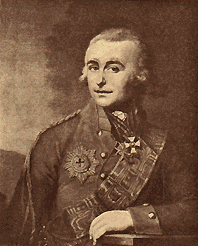|
| RUSSIAN DIPLOMATS IN PARIS |

TOLSTOY PETER ALEXANDROVICH (1761-1844) Count, infantry general, diplomat Since 1775 he has been on a military service. Tolstoy was the participant of Russian-Turkish war of 1787-1791 and also of the Polish campaign of 1794-1795. He was distinguished at the assault of Prague. In 1799 he was sent to the commander-in-chief of the Austrian army in Germany, archduke Carl, for organization of cooperation with army of Suvorov. In 1803-1805 Tolstoy was the military governor of St.-Petersburg and commander of leyb-guards Preobrajensky regiment. In September, 1805 he sailed with 20 thousand landing corp to Pomeranya for operations under the main chief of the Swedish king Gustave-Adolph IV against the French in Northern Germany; but the battle at Austerlitz has completely changed the situation and the corps of Tolstoy had to return by overland to Russia. In the beginning of war 1806 - 1807 Alexander I has entrusted Tolstoy to settle the relations between enmity corps commanders (Bennigsen and Bugsgevden) and to inform on all occurrings personally the tzar. After nomination of Benningsen the commander-in-chief Tolstoy became a duty general; and then during spring campaign he commanded reserve of the army and alarmed the enemy from the party of Ostrolenka and covered the boundaries of Russia from the side of Narva.
Since October 1807 till October, 1808 Tolstoy has been the ambassador extraordinary in Paris. This time Tolstoy wrote to tzar that all friendly assurances of French Emperor were deceit and lie and begged not to believe it and to make dispositions to rebuff beforehand and predicted the future intrusion of the French into our limits. He recommended to the Russian government a system of measures for protection Russian interests against the possible Napoleon I aggression: to increase army to its maximum, to move it up to western boundaries, to conclude the secret agreement with Austria, to terminate the war with Turkey and Sweden, to conclude peace with England, to organize a new antiFrench coalition with Prussia and Austria. Napoleon couldn't have such ambassador at his court yard; after the meeting of the emperors in Erfurt Tolstoy have been recalled.
On June 17, 1812 he was nominated as the commander of the troops in the Kazanskaya, Nizhniy Novgorodskay, Penzenskay, Kostromskaya, Simbirskaya and Vyatskaya gyberniy (regions). Actively supervising the recruting and formation of the home guard, Tolstoy at the end of the Patriotic war took part in the campaign with his troops. In 1813 they were reorganized into the special corps and entered into the structure of so-called Polish army of Benningsen with which they moved to Bohemia. At the general offensive to Leipzig, the corp of Tolstoy was left under Dresden for blockade of this city held Guvion Saint Sir. On the eve of the Leipzig battle Guvion Saint Sir, having found out about weakness of the Tolstoy's troops has made general sortie and throwed him back to Seissa without any difficulty and with rather considerable loss; but Tolstoy reinforced by different Austrian groups in his turn has pushed aside the French and assisted in seizing of Dresden.
In the last years of Alexander I reign Tolstoy commanded the 5-th infantry corp in Moscow. In 1828 he was the commander -in-chief in St.-Petersburg and Kronstadt. In 1831 has formed in northwest regions a reserved army and pacified very quickly the revolt in Lithuania. Tolstoy was the member of the State Council(since 1823) and of the Cabinet.